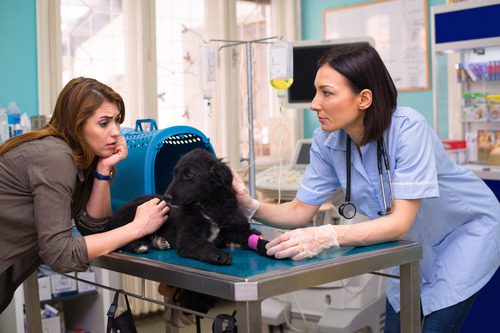It’s not easy to stay calm when your dog suddenly starts throwing up yellow bile. The color alone can catch you off guard—and the worry sets in quickly. Is it something they ate? Is it serious? Many pet owners face this unsettling situation, and knowing what it might mean can make all the difference. This blog breaks down why your dog might be vomiting yellow bile, what signs to watch for, and when it’s time to seek help from Fetch Specialty & Emergency Veterinary Centers. If your dog’s behavior has changed or the vomiting continues, don’t wait—keep reading to learn what’s going on and what to do next.

What Is Bile and Why Is My Dog Throwing It Up?
Yellow bile is a digestive fluid that helps break down fats during the digestion process. It’s produced by the liver and stored in the gallbladder, then released into the small intestine.
Bile in Vomit – What It Means
When a dog throws up yellow bile, it usually means that the stomach is empty. The bile may be regurgitated along with stomach acid or mucus. This type of vomiting often happens in the early morning or late at night after a long gap between meals. However, vomiting bile can also indicate irritation in the stomach or upper digestive tract, or it may be linked to a more serious health issue that needs veterinary attention.
Common Causes of a Dog Throwing Up Yellow Bile
Several potential causes could be behind your dog’s yellow vomit. Some are relatively minor and easy to manage, while others may require urgent care.
Empty Stomach and Hunger Pukes
If your dog skips a meal or goes too long without eating, bile can build up in the stomach. This irritates the stomach lining and can trigger vomiting. It’s a common issue in dogs that are fed only once a day.
Bilious Vomiting Syndrome (BVS)
This condition occurs when bile leaks into the stomach from the small intestine, especially after a long fasting period. Dogs with BVS often vomit bile in the early morning. While not immediately dangerous, it’s uncomfortable and should be addressed with your vet.
Dietary Indiscretion
Dogs are curious by nature and may eat something that doesn’t agree with them. This could include grass, table scraps, or garbage. These items can upset the stomach and lead to vomiting bile.
Gastrointestinal Inflammation or Disease
Vomiting bile may point to inflammation in the GI tract—such as gastritis, pancreatitis, or inflammatory bowel disease. These conditions can cause stomach irritation, nausea, and bile vomiting.
Blockages or Obstructions
A foreign body or tumor that blocks the intestinal tract can prevent food and bile from moving properly. This situation is an emergency. If your dog is lethargic, bloated, or repeatedly vomiting bile, seek veterinary help immediately.
When to Call Your Emergency Veterinarian
Not all bile vomiting cases are urgent, but some definitely are. It’s important to monitor your dog’s overall condition and behavior.
Signs That Warrant Immediate Veterinary Care
Contact Fetch Specialty & Emergency Veterinary Centers right away if your dog:
- Vomits multiple times in a day
- Seems weak or lethargic
- Has diarrhea or blood in the vomit
- Shows signs of abdominal pain
- Refuses food or water
- Appears dehydrated (dry gums, sunken eyes)
These symptoms can indicate a more serious underlying problem that needs prompt evaluation and treatment.
What to Expect at Fetch
Your veterinarian may recommend a physical exam, blood work, imaging (like X-rays or ultrasound), or other diagnostics to find out why your dog is throwing up yellow bile. The treatment will depend on the underlying cause and may include fluids, medications, dietary changes, or in severe cases, surgery.
What You Can Do Before the Appointment
While waiting for your veterinary appointment or during the drive to an emergency clinic, there are a few things you can do to support your dog.
Keep Your Dog Calm and Comfortable
Vomiting can be stressful for dogs. Keep them in a quiet, safe area with soft bedding. Avoid offering food or water until you speak with your vet, especially if vomiting is frequent.
Track Vomiting Frequency and Symptoms
Make note of how often your dog is throwing up yellow bile, what time of day it happens, and if there are any other symptoms like appetite loss, diarrhea, or changes in behavior. This information will be helpful for your vet’s evaluation.
How Bile Vomiting Is Treated in Dogs
The approach to treatment depends on the diagnosis. In most cases, resolving the vomiting requires addressing the root cause and relieving the irritation in the stomach.
Feeding Adjustments
For dogs who vomit bile due to an empty stomach, your vet may recommend breaking meals into smaller, more frequent feedings throughout the day. This helps reduce bile buildup.
Medications
If inflammation is involved, anti-nausea medications or drugs that reduce acid production may be prescribed. Dogs with BVS or chronic gastritis often benefit from these.
Managing Underlying Conditions
If the vomiting stems from a condition like pancreatitis or inflammatory bowel disease, targeted treatment and long-term care may be necessary. This might include prescription diets or medications.
Tips to Help Prevent Future Episodes
Preventing future vomiting episodes often involves routine changes and close observation.
- Consistent Feeding Schedule: Feeding your dog at regular intervals can prevent bile from accumulating in the stomach. Two or three meals per day often work well for most dogs.
- Monitor Their Environment: Avoid giving your dog access to trash, table scraps, or unfamiliar objects. Use pet-proof bins and supervise outdoor play to help prevent dietary indiscretion.
- Work with Your Veterinarian: Ongoing check-ins with your veterinarian help monitor your dog’s digestive health, especially if vomiting becomes a recurring issue. Regular wellness visits can catch problems early.
Vomiting yellow bile can be unsettling to witness, but understanding what it means helps you respond effectively. While some causes are minor, others need quick attention from a veterinary professional. If your dog is throwing up yellow bile and showing other signs of distress, call Fetch Specialty & Emergency Veterinary Centers. We’re here 24/7 to support you and provide expert care when your pet needs it most.
About Us
Fetch Specialty & Emergency Veterinary Centers is a family-owned practice providing elevated specialty care, emergency medicine, and critical care in three convenient locations throughout Florida and South Carolina. Our board-certified veterinarians and highly skilled support staff all share a deep appreciation for pets, people, and the human-animal bond. We recognize how much you love your pet as a part of your family, and that’s why we love what we do!

